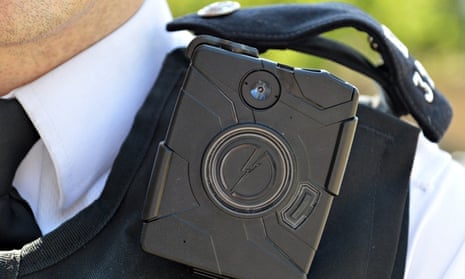Police departments around the US are rapidly adopting body-worn cameras, but Miami Beach in Florida could be the first city in the country to ask meter maids to wear them.
If city management has its way, code enforcement officers, city fire inspectors, building inspectors and uniformed police officers will all be asked to wear the cameras.
“There seems to be unanimous political support,” said Jimmy Morales, Miami Beach city manager. “I think there’s a lot of political support for it, I think there’s a lot of public support for it.”
Miami Beach’s plan would deploy 602 cameras in a program that’s expected to cost around $3m over five years, according to quotes from Taser International obtained by the city. The technology, officials say, would bring greater transparency to the city departments.
“This is a very big priority with the mayor and the city management,” said Eric Kolbinsky, the city’s recently appointed emergency management specialist.
Civil libertarians have approved of the cameras for police use, and said the technology could deter unnecessary use of force and provide accountability for officers. But ACLU senior policy analyst Jay Stanley sees the approval as a delicate balance between privacy and the deadly force that police officers wield.
“I’m sure Taser’s interest is for everybody and their grandmother to wear one of these, but that’s not the right balance for the public,” said Stanley.
“Thinking about it for 10 seconds, I suppose we should have anticipated that this technology, like so many technologies, would undergo mission creep,” said Stanley. “The companies would push them as broadly as they could, and that we would have to draw some lines about where it is and is not appropriate to use this technology.”
An often-cited study by Cambridge University showed that a small police department in Rialto, California, experienced sharp drops in use of force and public complaints after instituting the cameras, 59% and 88% respectively. However, it’s not clear that studies looking at similar programs among municipal workers exist.

Some of the recordings would be subject to open records laws, but policies describing when city workers must activate the cameras are still being written.
“Our plan was for these other departments to basically take the police department’s policy,” and tweak it, Kolbinsky said.
Since 2008, several corruption scandals and convictions have stemmed from departments where camera programs are being planned. But combatting corruption is not the program’s main thrust.
“The basis for the institution of the program is not to catch corruption, it’s to build transparency,” said Chuck Tear, emergency management director. “It’s not like we’re concerned about having a bunch of people out there that are corrupt.”
In 2012 alone, seven city workers were caught up in an FBI anti-corruption sting, including the city’s lead code compliance officer, four more of the compliance officer’s employees and two firefighters, according to the Miami New Times.
To privacy concerns, Morales said the cameras would be used in “public encounters, in public settings, where really there is no expectation of privacy”, and argued that bank, business and cellphone cameras already diminish privacy outside the home.
“The only issue that is of somewhat of a concern to us right now is the bandwidth that’s going to be required for the transfer of the data the uploading of the videos,” said Kolbinsky, about uploading the videos to Taser’s private evidence storage website, Evidence.com. Most of the cost of the program, and most of Taser’s camera-related revenue, comes from subscriptions to the website.
The proposal is designed to be included in the city’s annual budget, Morales said. It’s unclear if it could hit political snags before it’s instituted.
“What is this, 1984? We hope this is a miscalculation from a mid-level bureaucrat and we hope that an elected official will see through it,” said Richard McKinnon, a spokesperson for the CWA.
“It’s my understanding that some city leaders are, you know, for it, and supporting it,” said Eugene Gibbons, an attorney representing Miami Beach’s local Fraternal Order of Police chapter. “I don’t know how well thought-through they have been with it.”
“You have a medical issue at your home, you call police, you don’t expect it to to be recorded on video forever, and for somebody to come and request [it] and be used against you in some sinister way,” said Gibbons, about the recordings potentially being public record. “It’s just a very, very touchy subject.”

Comments (…)
Sign in or create your Guardian account to join the discussion